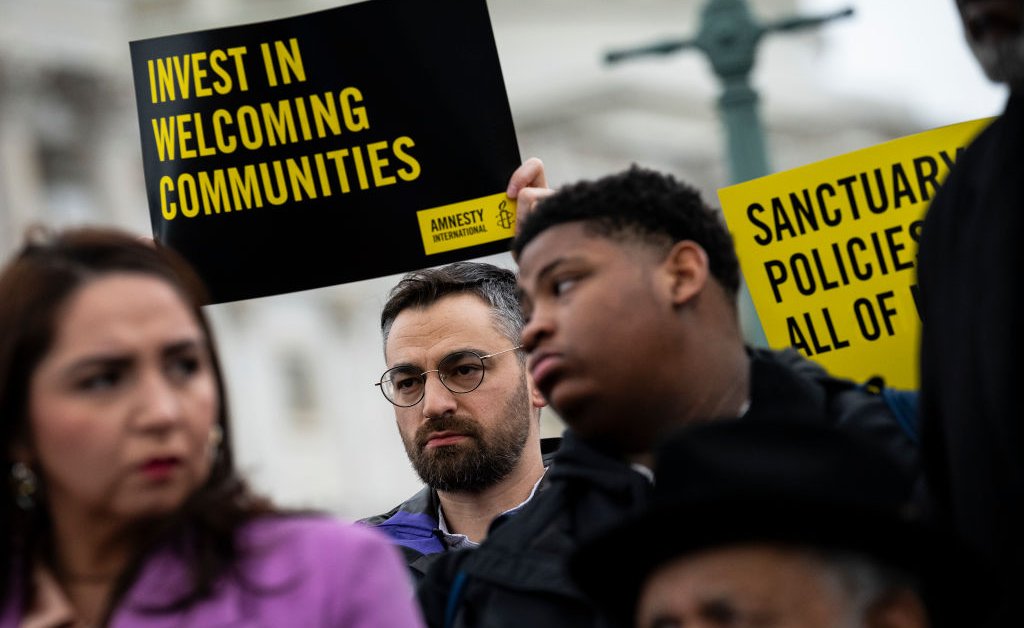Donald Trump has been dealt a significant setback in his ongoing battle over sanctuary cities, after a U.S. federal judge threw out the Administration’s lawsuit which looked to block legislation in Illinois that limits local law enforcement from cooperating with federal immigration authorities.
The Trump Administration argued that existing so-called “sanctuary laws” in the state run counter to federal laws because they restrict local officials from sharing information with federal agents, stopping immigration officials from identifying people who “may be subject to removal.”
But those concerns were dismissed by Judge Lindsay C. Jenkins, who said finding sanctuary policies as “impermissible regulation”would run counter to the Tenth Amendment.
“It would allow the federal government to commandeer States under the guise of intergovernmental immunity—the exact type of direct regulation of states barred by the Tenth Amendment,” said the judge.
Jenkins, who was appointed by former President Joe Biden, added: “Because the Tenth Amendment protects defendants’ sanctuary policies, those policies cannot be found to discriminate against or regulate the federal government.”
Trump’s war with sanctuary cities began on day one in office, with an Executive Order, titled “Protecting the American People Against Invasion.” In the Executive Order, Trump argues that sanctuary jurisdictions “seek to interfere with the lawful exercise of Federal law enforcement operations,” and calls on the Attorney General and Secretary of Homeland Security to withhold federal funding from these cities. In April, Trump then signed an Executive Order asking Attorney General Pam Bondi and the Department of Homeland Security (DHS) identify cities and states that don’t sufficiently comply with Trump’s federal immigration laws within a month.
It is a continuation of Trump’s first term, during which he also signed an Executive Order that looked to ensure sanctuary jurisdictions did not receive federal funding. At the time, though, multiple cities sued Trump, and the courts subsequently upheld the legality of such provisions.
Read More: What Are Sanctuary Cities and Why Is Trump Targeting Them?
Though Trump’s battle might be lost in Illinois, his Administration continues to fight across the country. The day before the lawsuit in Illinois failed, Thursday, the Department of Justice (DOJ) announced new legal action against New York City for its sanctuary laws. Earlier this week, Louisville, Kentucky chose to acquiesce to the administration’s immigration policies and cease its designation as a sanctuary city.
As human rights organizations argue for the importance of sanctuary and some cities push back against what they view as federal government overreach, the question remains which cities are fighting back against the crackdown.
Chicago’s and Illinois leadership was very clear in its desire to challenge Trump’s immigration policies. Illinois Gov. J.B. Pritzker celebrated the ruling on X, saying that, “Illinois just beat the Trump Administration in federal court.”
“This ruling affirms what we have long known: that Chicago’s Welcoming City Ordinance is lawful and supports public safety,” Chicago’s Mayor Brandon Johnson said in a statement responding to the ruling, saying he was “pleased” with the decision. “Chicago cannot be compelled to cooperate with the Trump Administration’s reckless and inhumane immigration agenda.”
Chicago’s status as a sanctuary city is just one iteration of the term—though the long-time Democratic city has been designated as such cities that limit information shared with federal immigration officers. Though there is no specific definition for a sanctuary city, the term refers to jurisdictions with a wide range of laws in place to limit their cooperation with federal immigration enforcement. For Chicago in particular, their “Welcoming City Ordinance,” argues that “partnering with [Immigrations and Customs Enforcement (ICE)] would go against our mission to make Chicago the most immigrant friendly city in the country and turn ours into a community of fear for immigrants.”
The Trump Administration, though, also has ongoing suits against not just New York City but also Los Angeles, Denver, Rochester, and four cities in New Jersey. Tom Homan, President Trump’s “border czar,” also has laid out the administration’s plans to continue combat sanctuary cities.
Read More: Sanctuary Cities Are Not New
“Sanctuary cities are sanctuaries for criminals—hard stop,” Homan said. “And President Trump made a commitment a couple weeks ago that we’re going to prioritize sanctuary cities.”
Simultaneously, certain cities designated “sanctuary cities” have been less strong in their pushback against the federal Government. Louisville’s Department of Corrections will now notify the Department of Homeland Security (DHS) at least 48 hours before an inmate with an immigration detainer is scheduled to be released from custody.
The city’s mayor, Craig Greenberg cited “a terrifying increase in raids by ICE, including mass raids” on cities designated as sanctuary cities—claiming that by taking Louisville off the designated sanctuary city list, he prevents risking “ the safety of our broader immigrant community.”
While New York City has remained the country’s largest sanctuary city, its status as such and Mayor Eric Adams’ desire to push back against the federal government has come into question. Even before the latest lawsuit issued by the Trump government, Adams’ Administration had been embroiled in a battle with the New York City Council and court system to allow ICE agents into Rikers Island.
Though he has said he will “without a doubt” keep the city’s sanctuary status. Adams has called for changes to the city’s sanctuary laws after the Justice Department suit, saying that they “go too far” in some places.
“I think we need to tweak the current laws to allow us to coordinate with the federal government when it comes down to removing those dangerous people from our streets,” Adams told CBS New York.
Back in February, Adams’ cooperation with the federal government came under questioning after the Justice Department ordered federal prosecutors to drop corruption charges against the Mayor, stating that the case was interfering with the Democratic mayor’s ability to follow through with the President’s agenda to crack down on illegal immigration.
The move pushed Gov. Kathy Hochul to consider removing Adams from office.
Read the full article here


